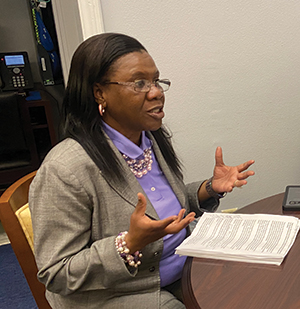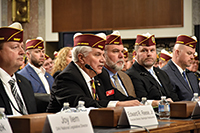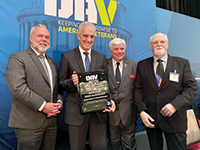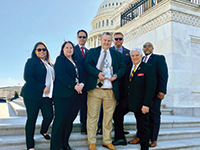
The room fell silent as Penni Lo’vette Brown detailed her experience as a woman veteran to a staff member of Rep. Doug LaMalfa. The congressional aide asked for concrete examples of how women are treated when seeking care from the Department of Veterans Affairs.
That’s when things got personal.
“For the first 10 years I went to the VA, I was ‘Mr. Brown,’” she said. “That was unacceptable then, and it’s unacceptable now.”
Brown, a survivor of military sexual trauma, said it was an honor to come to Washington, D.C., for her third DAV mid-winter conference.
“I understand that getting through the door and impressing the staffer is paramount,” said Brown, a member of DAV Chapter 91 in Lompoc, California.
She is one of the hundreds of DAV members and leaders who traveled to the nation’s capital to advance DAV’s critical policy goals.
Dozens of U.S. representatives, senators and their staffs met with DAV members and supporters to consider issues ranging from guaranteeing concurrent receipt of earned VA compensation and retirement pay to improving long-term care services and support for service-disabled aging veterans.
“We are a grassroots organization with a rich history stretching back over a century. When we speak, people listen,” DAV National Commander Joe Parsetich said while kicking off the conference in Arlington, Virginia. “Perhaps nowhere else is that more apparent and needed than right here beside our nation’s capital.”

Parsetich’s leadership was on display at a joint session of the House and Senate Veterans’ Affairs Committees. Surrounded by his fellow veterans, the service-connected disabled Air Force veteran described his experiences in Vietnam and mental health struggles after returning home to the panel of lawmakers.
Although he was honorably discharged in 1972, memories of enemy rockets exploding reminded Parsetich of those who lost their lives in combat. His mental state had become so dire that, in 2009, he attempted suicide.
“I saw myself as an unworthy burden to those around me, and I attempted to end it all,” he explained to the lawmakers. “I sit before you today with the humble admission that I’ve never been so happy or fortunate to fail at something.”
In his testimony, Parsetich called on Congress to provide the VA with the resources, staffing and support required to reduce veteran suicides. While the veteran suicide rate has dipped marginally since it was first reported in the VA’s 2012 Suicide Data Report, nearly 17 veterans a day are still dying from suicide, according to VA data from 2020. Veterans are more than 57% more likely to take their own lives than those who never served.
Suicide prevention remains the VA’s foremost clinical priority, and improving access to mental health programs and services to prevent suicide is one of DAV’s critical policy goals for 2023 as well.
VA Secretary Denis McDonough addressed the issue head-on at the opening session of the conference. “Vets need suicide prevention programs that meet them where they are rather than taking a one-size-fits-all approach,” said McDonough.
He also laid out some potentially lifesaving tactics the department is undertaking.

In February, the VA announced 10 winners of Mission Daybreak that will receive a total of $20 million as part of the department’s 10-year strategy to end veteran suicide. McDonough also mentioned additional grants and efforts to recruit, hire and train other licensed mental health providers and to expand VA mental health coverage through the Veterans COMPACT Act.
As of January, any veteran can access “any health care facility—VA or not—for free emergency mental health care,” added McDonough.
Suicide prevention and other critical policy areas were at the top of DAV members’ minds throughout the four-day conference. Traveling the halls of Capitol Hill, members put a human face on often-complicated issues while they met with the few people making crucial decisions about veterans health care policy and benefits.
DAV member Mack Bailey, a Marine veteran and first-time mid-winter participant, attended meetings with all eight offices of the Louisiana congressional delegation. He said the chance to meet with his elected officials was dizzying but invaluable.
“I think we were received pretty well,” said Bailey, the Benefits Protection Team leader for the Department of Louisiana. “I really believe we spoke to the right people, and it’s good to advocate for all the people who can’t come here themselves.”
He added that he’s particularly passionate about bringing the issue of mental health to lawmakers and that the meetings were productive and engaging.
“It seemed like they listened and really cared,” added Bailey. “They all took notes, and we broke down our six critical policy goals.”

Members also had the opportunity to attend in-person presentations, including the Benefits Protection Team Seminar. National Legislative Director Joy Ilem presented this year’s Outstanding Performance in Advocacy awards to five dedicated DAV departments and their Benefits Protection Team leaders: John Plahovinsak (Ohio), Trent Dilks (Minnesota), Al Labelle (Wisconsin), Craig Florey (Maine) and Jerry Estes (Utah).
“DAV is blessed to have such dedicated advocates within our ranks, and these five individuals are no exception,” said Ilem. “We wouldn’t have had our level of legislative success without engaged members such as these bringing the issues touching veterans’ lives to the people who need to hear it.”
Throughout the seminar, participants received background information and highlighted DAV’s six critical policy goals for 2023:
- Correct inequities and provide parity in compensation benefits for veterans and survivors.
- Implement the PACT Act and address gaps in toxic-exposure benefits.
- Ensure equity in VA care, services and benefits for women, LGBTQ+ and minority veterans.
- Provide a full spectrum of long-term care options for service-disabled and aging veterans.
- Bolster mental health resources to ensure continued progress in reducing veteran suicide.
- Expand the VA’s capacity to deliver timely, high-quality health care to veterans.
DAV also named Sen. Jon Tester, chairman of the Senate Veterans’ Affairs Committee, the recipient of the 2023 Veterans Champion Award. Tester said the award was an honor, notably since Commander Parsetich, a fellow Montanan, presented it.
“I’m proud of the work we’ve done together to defend veterans health care and benefits with bipartisan victories for toxic-exposed vets, like the PACT Act, and mental health care in the Hannon Act,” said Tester. “As chairman, I’ll always have veterans’ backs in Washington and hold VA accountable to do right by their service each and every day.”
“DAV and our more than 1 million members greatly appreciate Sen. Tester’s unmatched commitment to fighting for the best interests of veterans and their families and his significant contributions to improve health care services and benefits for those who served,” added Parsetich.
“Over the past 17 years in the Senate, he has led bipartisan efforts to enact landmark legislation to provide long-overdue health care to toxic-exposed veterans, bolster access to health care, expand veteran caregiver assistance, modernize and strengthen education benefits, and eliminate barriers to care and improve services for women veterans.”






